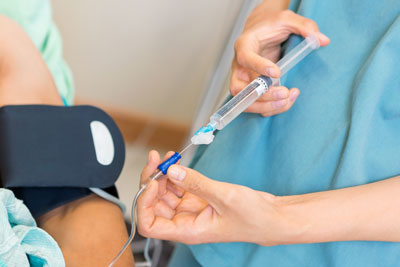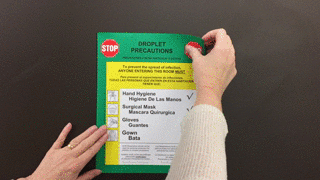Healthcare Label Adhesive Selection
The fact is, labels are applied to hundreds of items across a healthcare facility. From small syringes and vials for medication identification to medical devices detailing maintenance information, the performance of those labels impacts patient care.
Medication Dispensing

Whether medications are prepared at the bedside or in the pharmacy, require refrigeration or injection into an IV line, labels inform and help guide proper medication dispensing. But, not if the label falls off in transit, accidentally transfers to another IV bag or crinkles making the information unreadable.
Application Temperature vs. Service Temperature
Labels fail for various reasons. But, one of the most common causes is using an adhesive that works where the item is used but not where it’s applied. Consider a medication vial or IV bag. Although it is typically dispensed in a 70-degree hospital room, the items are often labeled and then placed into a 38-degree refrigerator. Using the wrong adhesive can cause labels to fall off syringes and vials. And, when multiple IV bags are stored together in a refrigerator, it can cause a label to transfer from the original bag to another one.
Labeling Plastics
Furthermore, the plastic contained in dispensing vials, IV bags and medication containers create additional labeling challenges. The smoothness/roughness, porosity and flexibility of the container and outgassing, a process that occurs when plastic is exposed to heat or sunlight, can all cause labels to peel and fall off. Labels do work under these conditions. But, it pays to do your research and work with companies that understand your applications and workflows.
Biomedical And Clinical Engineering
Medical imaging machines, treatment equipment, life support equipment, medical monitors, and more, require ongoing inspection, maintenance and calibration. The timing and results of those steps are often recorded on the equipment through a label. But medical devices require a multipurpose label that:
- Adheres to the surface of the equipment
- Stands up to cleaners
- Resists tampering
- Is waterproof
Label face stocks and adhesives that don’t meet these specifications fall off and obscure information which hides important details. In addition, many medical devices use a textured type of finish. Although this looks aesthetically pleasing, it creates two challenges. For a label to stay secure on the device, it requires special label materials and adhesives. And, because the textures and raised print on the device can trap bacteria and germs, it requires extra staff diligence to prevent the spread of infections. UAL designs biomedical and clinical engineering labels with these challenges in mind.
Sterilization And Disinfection

Sterilization and disinfection are critical to infection prevention. But, depending upon the medical devices, choosing a method of disinfection, remains difficult. However, for items such as surgical instruments, implantable medical devices, and more, there are steps that ensure the item is cleaned and disinfected properly. Autoclave labels provide visual evidence that an item is ready for use. The label remains adhered to the item during the sterilization process. And, it changes color once reaching the proper sterilization level. Plus, once the process is complete, communication labels inform staff that the item is ready for use.
Infection Prevention

For staff, visitors and patients, signs and labels that encourage hand washing and other precautions are common infection prevention deterrent tactics. But, when signs are applied in prominent germ locations, like patient bathrooms, the signs can become the germ magnet. Use materials that allow cleaning without damaging the sign. Plus, the repositionable adhesive allows cleaning crews to clean the sign, remove it, clean the entire area properly and reapply it, helping to keep the area as germ-free as possible.
United Ad Label
There are hundreds of companies that sell labels but very few understand the complexities of label materials, adhesives and your unique healthcare applications. UAL’s label and healthcare knowledge helps to ensure that the products required throughout your organization work properly. And we’re so confident in their performance, that if you don’t like the product for any reason, you can return it within 60 days, no questions asked. Browse our catalog or speak to our customer service team to learn more.